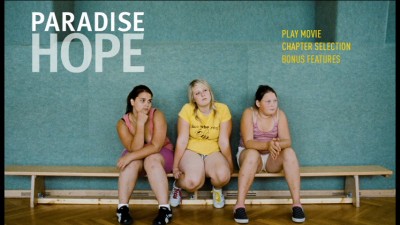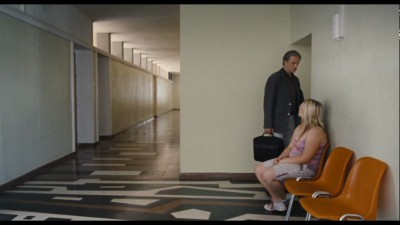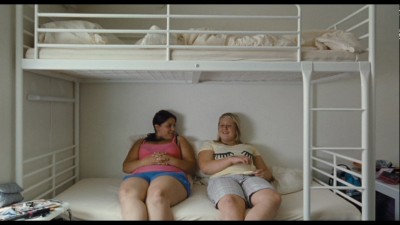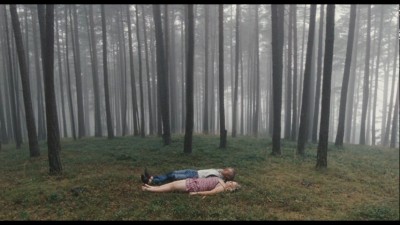| Reviews & Columns |
|
Reviews DVD TV on DVD Blu-ray 4K UHD International DVDs In Theaters Reviews by Studio Video Games Features Collector Series DVDs Easter Egg Database Interviews DVD Talk Radio Feature Articles Columns Anime Talk DVD Savant Horror DVDs The M.O.D. Squad Art House HD Talk Silent DVD
|
DVD Talk Forum |
|
|
| Resources |
|
DVD Price Search Customer Service #'s RCE Info Links |
|
Columns
|
|
|
Paradise: Hope
THE MOVIE:
Updated April 17, 2014

Austrian director Ulrich Seidl completes his downer of a film trilogy with Paradise: Hope, the most youthful story of the three Paradise movies, though no less downbeat for its age or the better tomorrows falsely promised in its title.
Melanie Lenz stars in Paradise: Hope as Melanie, an adolescent girl whose mother has sent her to a diet camp for the summer to lose some weight. (Mom has gone to Kenya, as seen in Paradise: Love; her aunt is the main character in Paradise: Faith). Melanie joins the a dormitory of girls, all of whom are as unmotivated to be there as she is. The camp is a kind of prison, where food and activity are regulated. Phone time is limited, and days are spent learning about nutrition and performing often humiliating exercises. You know that old ditty "if you're happy and you know it clap your hands"? At diet camp, it's "clap your fat." Thighs, belly, bum.
Looking to get out of exercising, Melanie goes to the facility doctor (Joseph Lorenz) feigning a stomachache. He is clearly skeptical of this ailment, but he examines the girl anyway, making playful, possibly flirtatious, use of his stethoscope. Melanie is smitten, and she returns to see him regularly. In their private sessions, he seems to like her, too; in public, he rebukes her. Theirs is an unhealthy relationship no matter how you cut it, signifying a hopeful future as out of reach as Melanie's intended weight loss.

Seidl portrays the diet camp with the same dry brushstrokes as he used in the preceding films, but the dispassionate rendering makes the setting seem surreal and almost satirical. The grinding routine only succeeds in making the kids feel bad about themselves, and in the absence of food, they become obsessed with sex and other mischief. Underlying all their talk about the grooming habits of the opposite sex and past dalliances, however, is the same basic yearning: each child really just longs to be loved and made to feel safe. Even at her most reckless, Melanie is looking to attract affection and attention. In his way, the doctor provides these things, even if we never are exactly clear on his motives.
Lenz and her young castmates perform with a natural comfort. Much of what Seidl captures comes across as genuine horseplay, as if his troupe is merely living out the summer camp scenario he created for them. This makes the emotional danger in Paradise: Hope feel even more crucial, even if some of it is a bit cartoony. (At a bar, Melanie is victimized by two greased-up juvenile delinquents lifted out of a 1950s exploitation movie.) This realism also makes it all the more deflating when the film draws no conclusions for its young protagonist. She is just as alone and helpless in the end as she was in the beginning, only now more hurt and disappointed. In terms of ironic stingers, Paradise: Hope is the bleakest.

THE DVD
Video/Audio:
Paradise: Hope has been released on DVD at its original widescreen aspect ratio. The image has strong colors and a nice grain that maintains the expected cinematic look of Seidl's film, though the underlying resolution can appear a little soft, including very faint jagged tracers from time to time. Otherwise, the presentation is clean with no glitches.
The original soundtrack is mixed in 5.1. The sparse audio is worked nicely through the speakers, creating a realistic aural atmosphere befitting the style of shooting and the setting.
English subtitles are provided, and read well--though they are automatic and cannot be turned off.
Extras:
Extras include a photo gallery, trailers for the rest of the trilogy, and other trailers from the distributor.
FINAL THOUGHTS:
Recommended. Paradise: Hope concludes the Austrian film trilogy by Ulrich Seidl on an intensely sour note, but if you've got the fortitude, his drama about a teenage girl struggling with weight, loneliness, and a desire she is not entirely mature enough to understand is compelling and, at times, quite moving. Melanie Lenz has an empathetic screen presence, and Seidl's script toys with the audience's perceptions and, ultimately, our own hopes as we try to imagine a better outcome for the movie's teenage protagonist.

Jamie S. Rich is a novelist and comic book writer. He is best known for his collaborations with Joelle Jones, including the hardboiled crime comic book You Have Killed Me, the challenging romance 12 Reasons Why I Love Her, and the 2007 prose novel Have You Seen the Horizon Lately?, for which Jones did the cover. All three were published by Oni Press. His most recent projects include the futuristic romance A Boy and a Girl with Natalie Nourigat; Archer Coe and the Thousand Natural Shocks, a loopy crime tale drawn by Dan Christensen; and the horror miniseries Madame Frankenstein, a collaboration with Megan Levens. Follow Rich's blog at Confessions123.com.
|
| Popular Reviews |
| Sponsored Links |
|
|
| Sponsored Links |
|
|
| Release List | Reviews | Shop | Newsletter | Forum | DVD Giveaways | Blu-Ray | Advertise |
|
Copyright 2024 DVDTalk.com All Rights Reserved. Legal Info, Privacy Policy, Terms of Use,
Manage Preferences,
Your Privacy Choices | |||||||














